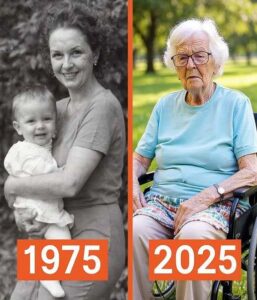Sons Abandoned Their Elderly Mother in a Nursing Home and Sold Her House — What Her Grandson Did Next Was Beyond Belief

For years, Margaret Hollis carried a quiet fear in her heart: that one day, the house she and her late husband George had built together would no longer be hers. The home was more than wood and nails—it was a living archive of their life. The doorframe still bore the penciled height marks of growing children, George’s favorite pipe lingered with a trace of tobacco, and curtains stitched by Margaret during leaner winters framed the windows.
George had once pressed his hand on the kitchen table and told her softly, “This house is yours, Maggie. Always.” Her sons had repeated that promise—yet, as Margaret learned, promises can break.
Just before her 81st birthday, her sons Daniel and Peter arrived with gentle words and papers ready to sign. “It’s safer,” they told her of the nursing home. “Better.” The truth cut deeper: her beloved house had already been sold—without her knowing, without her consent.
A Grandson’s Discovery
Weeks later, Margaret’s grandson Caleb came by, expecting one of her Sunday dinners, only to find the house empty. Shocked, he tracked her down at the nursing facility. Margaret, frail but clear-eyed, told him simply: “They’ve already sold the house. It’s done.”
But for Caleb, it wasn’t done. A young architect fresh back from New York, he could not stand by while the woman who had once rocked him to sleep lost everything. He sought out the buyer—Alfred Turner—and made an extraordinary choice. He bought the house back, paying $300,000 cash, draining his savings, and putting his own future on hold.
“This isn’t an investment,” Caleb said. “It’s a promise.”
Coming Home
When Margaret returned, the house was exactly as she remembered it. Caleb had restored every detail, every corner of comfort. Standing in her kitchen once again, Margaret wept—the tears of someone who had thought her story was over but discovered she was home. “I thought I was dreaming,” she whispered.
Caleb moved in with her, not as a guest, but as her caretaker and companion. Together, they built new routines inside the old walls—morning tea, shared dinners, evenings filled with quiet conversation. The house lived again, warmed by presence, not just memory.

A Different Kind of Justice
Weeks later, Daniel and Peter returned. They brought awkward apologies, weighed down with guilt. Margaret listened with the grace of someone who had endured much. Then she told them gently, but firmly:
“You will visit as sons. Not as decision-makers.”
She chose peace over bitterness. Revenge had no place in her heart. Caleb honored that choice, never speaking harshly of his uncles. Love, Margaret realized, doesn’t always arrive where expected. Sometimes it skips a generation, finding its way through a grandson’s quiet devotion.
Margaret lived out her years in the home George built, surrounded by dignity, memory, and love. And Caleb ensured she never again felt like a burden—proving that true family is not defined by promises spoken, but by the ones kept.